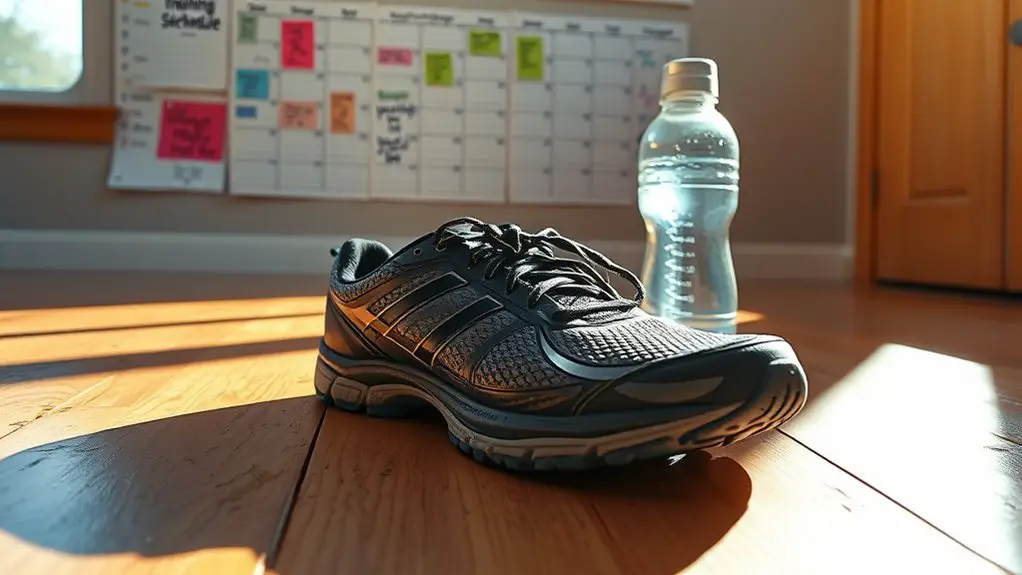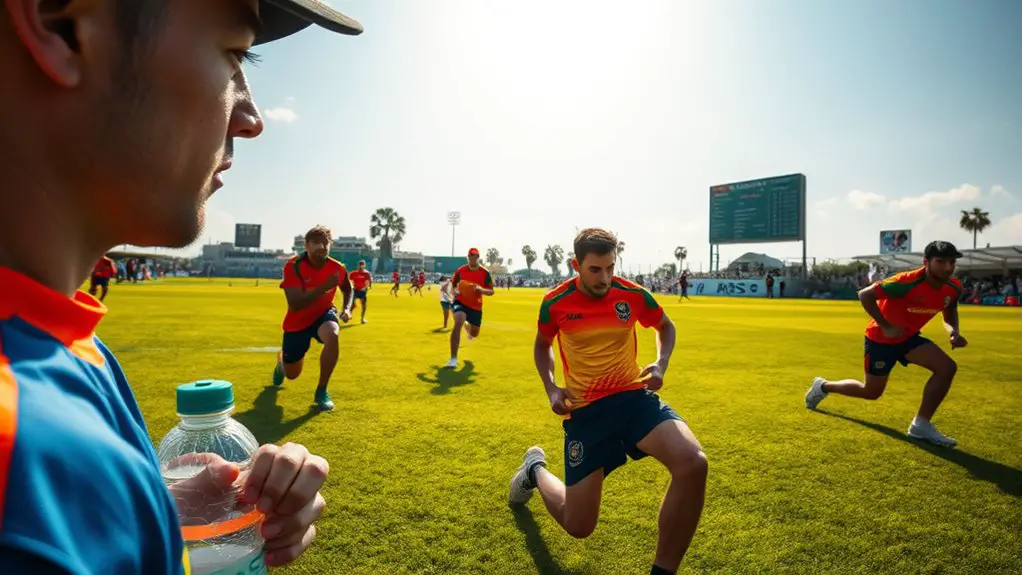Elite athletes overcome setbacks by adopting a growth mindset, viewing challenges as chances to learn and grow. They practice resilience, bouncing back from adversity through reflection and new strategies. Building a strong support system also helps them navigate tough times. Celebrating small victories keeps their motivation alive. With a focus on progress, they replace doubt with determination. Discover more about their strategies for success and how you can apply these principles to your own journey.
Understanding the Nature of Setbacks
While setbacks can feel discouraging, they're often an essential part of an athlete's journey. You might think of them as roadblocks, but they can actually serve as stepping stones. Each challenge presents an opportunity to learn and grow, pushing you closer to your goals. Embracing these moments means acknowledging that perfection isn't the aim; instead, it's about progress. Setbacks can reveal your true character and test your resilience, giving you the chance to discover your strengths. When you face adversity, you gain insights that can't be learned in times of success. By understanding setbacks as natural occurrences, you can cultivate a sense of freedom, allowing you to navigate your path with confidence and determination.
The Power of a Growth Mindset
Setbacks can be intimidating, but adopting a growth mindset can transform how you approach these challenges. Instead of seeing obstacles as failures, you'll view them as opportunities for growth. This shift empowers you to embrace discomfort and push your limits.
| Emotion | Reaction | Outcome |
|---|---|---|
| Frustration | Reflect | New strategies |
| Doubt | Learn | Increased confidence |
| Fear of failure | Adapt | Greater resilience |
When you cultivate this perspective, you free yourself from the fear of failure. You're not just surviving setbacks; you're thriving through them. Embrace the journey, and you'll discover that each challenge brings you closer to your true potential.
Building Mental Resilience
To build mental resilience, you need to develop strategies that help you bounce back from adversity. Embracing setbacks as opportunities for growth will empower you to face challenges head-on. Here are some effective techniques to cultivate that resilience:
- Practice mindfulness: Stay present and focused, reducing anxiety about past or future events.
- Cultivate a support network: Surround yourself with positive, encouraging individuals who uplift you during tough times.
- Embrace challenges: Seek out difficult situations to push your boundaries and strengthen your mental fortitude.
- Reflect on past successes: Remind yourself of previous achievements to boost confidence and motivation in overcoming current obstacles.
Setting Realistic Goals
When you aim for success as an athlete, setting realistic goals is essential for your progress. It's tempting to dream big, but if your goals aren't achievable, you risk disappointment and burnout. Start by evaluating your current skills and performance levels. Break your larger ambitions into smaller, manageable milestones that allow for steady improvement. This way, you can celebrate each achievement, which fuels your motivation and keeps you focused. Remember, flexibility is key; if you find a goal too challenging, don't hesitate to adjust it. Stay in tune with your body and mind, and embrace the journey. By setting realistic goals, you're not just chasing freedom in your sport, but also cultivating resilience and confidence each step of the way.
Learning From Failure
Achieving realistic goals is only part of the journey; learning from failure plays a vital role in an athlete's growth. Embracing setbacks can be a powerful catalyst for transformation. When you stumble, it's a chance to reflect and evolve. Here's how to turn failure into fuel:
- Analyze your mistakes: Understand what went wrong and how you can improve.
- Stay resilient: Every setback is an opportunity; keep pushing forward.
- Adjust your mindset: Shift from fear of failure to viewing it as a stepping stone.
- Practice self-compassion: Be kind to yourself; everyone faces challenges.
The Role of a Support System
While setbacks can feel isolating, having a solid support system can make all the difference in an athlete's journey. Surrounding yourself with friends, family, and mentors who understand your goals can provide the encouragement you need to bounce back. These individuals can offer perspective when you're feeling down, reminding you that every setback is a stepping stone. Their belief in you fuels your determination and helps you push through challenges. Sharing your struggles can lighten the emotional load, making it easier to navigate tough times. A strong network empowers you to keep pursuing excellence, ensuring you never face adversity alone. Trust in your support system; they're there to lift you up and celebrate your successes.
Embracing Change and Adaptability
Although change can be intimidating, embracing it is essential for athletes facing setbacks. When you open yourself up to new possibilities, you create opportunities for growth and resilience. Here are some ways to cultivate adaptability:
- Stay Curious: Ask questions and seek to understand rather than resist new ideas.
- Reframe Challenges: View obstacles as chances to learn and improve, not as roadblocks.
- Practice Flexibility: Adjust your routines and strategies based on your current situation.
- Celebrate Small Wins: Recognize progress, no matter how minor, to keep motivation high.
Visualization Techniques for Success
Embracing adaptability opens the door to various mental strategies, one of which is visualization. This powerful technique lets you imagine your goals vividly, creating a mental blueprint for success. Picture yourself achieving those milestones, whether it's crossing the finish line or nailing that perfect performance. By engaging all your senses, you transform these visions into reality.
Take a few minutes each day to close your eyes and visualize your journey. Feel the excitement, the adrenaline, and the satisfaction of your accomplishments. This practice not only boosts your confidence but also helps you overcome setbacks, as your mind is already familiar with success. So go ahead, embrace this freedom to visualize the path you want, and watch your dreams unfold.
Maintaining Physical Health and Wellness
To stay at the top of your game, maintaining physical health and wellness is essential for elite athletes. It's about fueling your body, staying active, and listening to what it needs. Here are some key areas to focus on:
- Balanced Nutrition: Eating a variety of foods guarantees you get the vitamins and minerals necessary for peak performance.
- Regular Exercise: Incorporating strength training, cardio, and flexibility workouts keeps your body primed.
- Adequate Rest: Sleep is critical for recovery, so don't underestimate its importance.
- Mental Health: Mindfulness practices and stress management can enhance your overall well-being.
Celebrating Small Victories
Staying physically healthy lays the groundwork for overcoming setbacks, but it's the mental resilience that truly propels elite athletes forward. Celebrating small victories is key to building that resilience. Each little achievement, whether it's hitting a new personal best or mastering a technique, can ignite your motivation. When you recognize these wins, you remind yourself of your progress and potential. It's about shifting your focus from the finish line to the journey, embracing every step along the way. So, take a moment to acknowledge your efforts, no matter how small. These celebrations create a powerful mindset, allowing you to break free from the weight of setbacks and truly excel in your pursuit of greatness. Remember, every victory counts!
Frequently Asked Questions
How Do Elite Athletes Define a Setback?
Elite athletes see a setback as an unexpected hurdle, a moment that tests their resolve. It's not just failure; it's an opportunity to learn, grow, and bounce back stronger than before. You can do this!
What Role Does Nutrition Play in Recovery?
When it comes to recovery, you can't ignore the fuel. Nutrition's the backbone of your healing process, helping repair muscles and restore energy. With the right diet, you'll bounce back quicker and stronger than ever!
Do Elite Athletes Ever Seek Professional Therapy?
Yes, elite athletes often seek professional therapy. It helps them manage stress, enhance mental resilience, and maintain focus. You'd find that prioritizing mental health is just as essential as physical training for peak performance.
How Important Is Rest During Recovery From Setbacks?
Rest's essential for recovery, isn't it? It allows your body to heal and your mind to reset. Without proper rest, you're risking prolonged setbacks. Listen to your body; it knows what you need.
What Specific Visualization Techniques Do Athletes Use?
Imagine your mind as a canvas. Athletes often use techniques like guided imagery, where you visualize success, and mental rehearsal, picturing every movement. These methods help you break barriers, embracing freedom in your performance.




